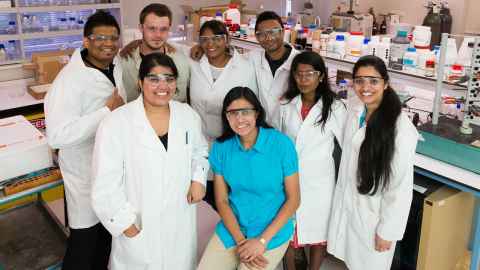Take 10 with... Viji Sarojini
Associate Professor Viji Sarojini from the School of Chemical Sciences is a contributor to the Food and Health Programme at the University of Auckland. She gives us 10 minutes of her time to discuss her research into the incredible world of peptides.

1. Describe your research to us in 10 words or less.
Peptides in chemistry, biology, medicine, food and material Science
2. Now describe it in everyday terms!
Peptides are a ubiquitous class of small biomolecules that exhibit surprising activity and impact. They perform a myriad of functions, for example control stress response (how best you cope with stress); protect you from invading microorganisms (antimicrobial peptides) or regulate blood glucose levels (insulin). You can find them in things like your anti-wrinkle cream, neuroprotective drugs, artificial sweeteners, and food preservatives. They are also responsible for the antifreeze activity of polar organisms (the antifreeze peptides). My research is about understanding the structure and function of peptides and developing novel peptides for applications in food, drug, health and material science.
3. Describe some of your day‐to‐day research activities.
Discussing research ideas, experimental design and results with students, writing manuscripts for journals, grant writing.
4. What do you enjoy most about your research?
I enjoy working with students and mentoring them. The freedom to do curiosity-driven research as an academic provides the drive to dig deeper into the fascinating world of peptides and share the joy of discovery and satisfaction that we are making a small difference to existing knowledge. My journey in peptide science – starting from my alma mater, the Indian Institute of Science in Bangalore, to my present day – has grown both in depth and breadth.
5. Tell us something that has surprised you in the course of your research.
Simple molecules can perform complex functions with amazing consequences. Whom 'you' know and 'who' knows you does matter in the scientific community!
6. What questions have emerged as a result?
I have started using advanced imaging and processing methods to understand better the biological, physiological and interesting impacts of peptides, the wonder molecules.
7. How have you approached any challenges you’ve faced in your research?
Keeping an open mind helps. Double-check the approach taken, read the literature and finally trust your gut instincts!
8. What kind of impact do you hope your research will have?
As an academic, publishing the research findings in top journals in the field of agricultural, food and medicinal chemistry with PhD students is itself impactful because you are essentially helping your junior researchers to realise and achieve their full potential. Knowledge generated along the way will lead to solutions in real-life scenarios, such as what the industry may be looking for (e.g. food-grade antifreeze) or medicinal chemistry. The real impact of academic research is realised through the success of students we train as future scientists.
9. If you collaborate across the faculty or University, who do you work with and how does it benefit your research?
Collaboration with people who have complementary skills (food structure and texture analysis, biophysical techniques, microbiology, pharmacy, and so on) has added value to the research. Names to mention include Professor Gillian Lewis, Associate Professor Silas Villas-Boas, Distinguished Professor Bill Denny, Professor Conrad Perera, Associate Professor Ashvin Thambyah, Associate Professor Chris Squire, Professor Mohammed Farid, Dr Zimei Wu, Associate Professor Simon Swift, Dr Siouxsie Wiles and my Chemical Sciences colleagues: Professor James Wright, Associate Professor David Barker, Dr Johannes Reynisson, Dr Jianyong Jin and Dr Ivanhoe Leung.
10. What one piece of advice would you give your younger, less experienced research self?
Well begun is half-done. Patience and perseverance are crucial to building a successful career. Be prepared to get out of your comfort zone, self-critique and set the bar high. Be intellectually honest to your research and cultivate optimistic and fun-loving scientific friends and colleagues around you to help keep the tempo going. Remain humble while also reminding yourself that sky is the limit!